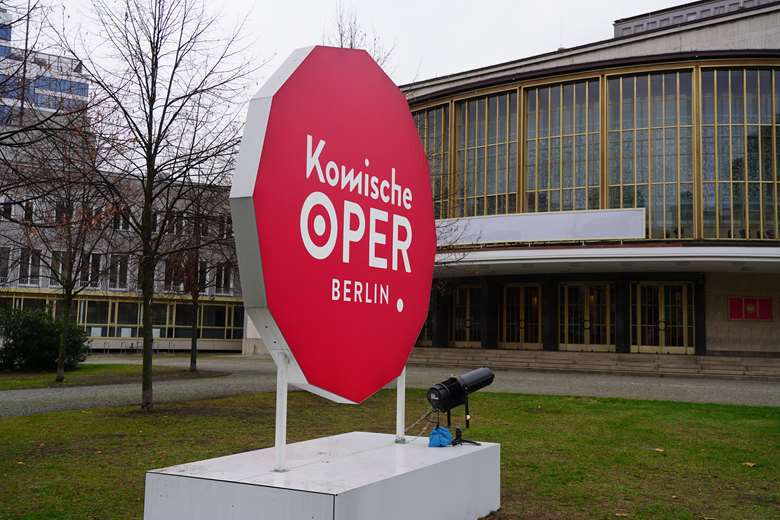Budgets, Buildings and Berlin: an uncertain future for the Komische Oper
Holly Baker
Wednesday, January 22, 2025
Budget cuts in the operatic capital put the future of major companies at risk. We look at the story so far

Berlin’s culture scene is a victim of brutal spending cuts which threaten the longevity of the city’s museums, galleries, and opera houses.
The Große Koalition in Berlin is attempting to cut at least three billion euros in 2025 from its 40 billion Euro budget, after years of heavy spending following COVID and an economic downturn has resulted in increasing debt. Therefore, in November they proposed plans of reducing culture funding. The arts make up 2.5% of the entire municipal budget and the cuts propose a 12% reduction in culture spending: a 130 million Euro setback.
The arts scene relies heavily on public money, in contrast to countries such as the United States where their cultural institutions are predominantly privately funded. Some have urged for a US-style philanthropic model to assist in financing the arts, however, there are fundamental structural differences which make it illegal for publicly funded institutions to take endowments in Germany. These changes cast an uncertain light on the future for cultural institutions in Berlin, big and small, as the cuts to fundings would put many in a difficult financial position.
Opera’s response
Berlin houses three major opera houses: The Staatsoper, Deutsche Oper, and Komische Oper. The cuts will create a challenging climate for all three to survive in and will most likely result in fewer productions, reduced educational programs and redundancies.
For the Komische Oper, which was named Company of the Year at the International Opera Awards in October, the new budget is particularly dangerous as they are in the midst of a multi-year, multi-million renovation of their home theatre. The budget cuts will cut the renovation funds for 2025 from 10 million euros to zero. Director Philip Bröking says that the upcoming budget cuts are extremely painful and, for many, difficult to implement.
Berlin’s culture senator Joe Chialo promised that the Komische Oper wouldn’t close, and that construction wouldn’t be halted, stating the importance of Berlin maintaining three opera houses. Yet with such brutal cuts to funding the Komische Oper’s future remains endangered.
The three major Berlin opera houses, in collaboration with ballet and theatre companies, released a statement saying: ‘The Senate is taking the breath out of cultural life in the city. Berlin lives through its culture. The cuts that have now been decided upon threaten jobs, cultural diversity and the very essence of this city.’
Barrie Kosky, former Director of Komische Oper, also wrote an open letter to the senate calling for Komische Oper renovation to continue. In it he accuses the politicians of erasing Jewish history within the city asking: ‘Is the anti-Semitism resolution just empty talk or do you really not understand that a theatre like the Komische Oper is a living example of the Jewish history that you so desperately want to preserve? Or is the Komische Oper just a series of numbers in a budget calculation, dispensable and merely a financially annoying issue?'
He continues: ‘The co-director of the Komische Oper has clearly explained to you the financial consequences of stopping construction. They are not the subject of this letter. My appeal relates to the building and its history. The building and its place in Berlin’s DNA.’
Paul Spies, co-president of the Berlin Museums Association and former Director of the Stiftung Stadtmuseum Berlin, told Art Newspaper TAN: ‘It’s a very bad decision – pennywise and pound foolish in every sense … and it’s been done so bluntly and without input from the cultural department.’
Mayor’s response
Berlin Mayor Kai Wegner, who is a member of the right-wing Christian Democratic Union, defended the budget cuts to TAN citing them as necessary for the financial sustainability of the city. He calls for a ‘change of mentality in many areas, including culture.’ He said Berlin has a ‘record budget’ of 40-billion-euros and that the three-million-euro saving will secure the ‘future of Berlin’ after a year of falling revenue. He blames the brutal cuts on the previous left-wing administration’s expensive climate initiatives which he describes as ‘green dreams’ that put a strain on the budget.
He also claimed in an interview with TAZ that ‘shop assistants don’t go to the opera anyway.’ The newspaper took Wegner at his word and conducted interviews to find out if this was truly the case. Their investigation proved the mayor wrong with the overwhelming message that ‘Kultur soll für alle da sein’ meaning ‘culture should be for everyone.’
The future
Before the budget was finalised there were protests and marches across Berlin, under the initiative ‘Berlin ist Kultur.’ Their unanimous message was that the cuts will ‘permanently destroy Berlin’s cultural infrastructure.’ Juli Zeh, a bestselling author, said the budget cuts were ‘politically incredibly dumb'.
In November the coalition Government of the Social Democrats and the Green Party and the Free Democratic Party collapsed resulting in a snap election to be held next month. It is an uncertain time for German politics and the arts seem to be a victim of this unrest. The far right in the form of the AFD party is also on the rise and their call for art-funding to be dependent on content and more German-centric is another concern.
It is predicted that the most damaging effect of these budget cuts will be potential closures, Berlin’s loss of status as a cultural capital of Europe, and endangered job security. The budget is an upsetting turn of events for a city whose vibrant cultural scene is such a captivating part of its history and identity and yet is still undervalued and dismissed. Despite tourists flocking to Berlin, many specifically for its artistic endeavours, the theatres, museums and opera houses have started the new year with a dark cloud over their heads, uncertain if they can survive 2025.










